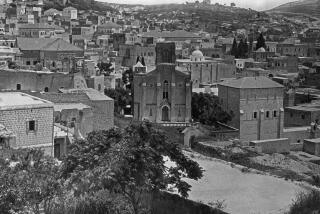BOOK REVIEW : Arab Kingdom Gets Taste of Corruption : VARIATIONS ON NIGHT AND DAY <i> by Abdelrahman Munif</i> . <i> Translated from the Arabic by Peter Theroux</i> . Pantheon: $23, 342 pages
- Share via
The novelist Abdelrahman Munif was born in Jordan to a family of Saudi Arabian merchants, and he now lives and writes in Damascus. For that reason alone, Munif’s “Variations on Night and Day” is intriguing and illuminating--we are not often given an opportunity to understand how the encounter between East and West looks from the Arab perspective.
“Variations,” the third and final volume in Munif’s ambitious and well-regarded “Cities of Salt” trilogy, depicts a fictional desert kingdom called “Mooran”--a place “buried in sand and oblivion”--and tells the tale of how one of its tribal chieftains manages to seize and hold power with the connivance of the British.
Clearly, Munif regards the intrusion of the West as a disaster, although he appears to blame the sheiks for allowing their palms to be crossed with petrodollars in the first place. And he suggests that Mooran is hopelessly corrupted even as it is enriched by the sudden acceleration of history.
“‘As . . . its sons composed and recited poems, and horse races were run again, and young girls went unmolested to the brooks, and the people were contented,” writes Munif of the seduction and betrayal of Mooran, “the hundred emirs undertook to transform it into an inferno.”
The most ambitious and ruthless of the emirs styles himself as Sultan Khureybit--he appropriates the title at the suggestion of his British sponsors--and the sultan manages to make Mooran into his personal fiefdom by the use of guile, gold and the sword in roughly equal measure.
Now and then, Munif allows us a sideways glimpse of a military campaign or an assassination plot, but the book is mostly concerned with the intrigue that swirls like smoke within the sultan’s “councils and encampments.”
We are shown how the wives and sons of the sultan make war on each other in the form of sinister tale-telling and elaborate practical jokes. We are allowed to understand that a wife’s worth is measured by the number of male offspring she produces, and sometimes the competition turns openly murderous. One of the sultan’s wives, we are told, tries to bribe a midwife to strangle the baby boy who was born to another wife.
“No one knew exactly who controlled the palace or how it was run,” explains Munif, “for in spite of its great number of officers and administrators, the place’s main features were its noise, commotion and chaos.”
The sultan is befriended by a calculating British officer named Hamilton, a figure who strongly resembles Lawrence of Arabia in his taste for dressing in Arab garb and his tendency to rhapsodize about the fate of the Arab nation under his guidance.
“Tonight is a conjunction of history, idealism and fate,” says Hamilton as he watches the celebration that follows a victory on the battlefield. “Only a madman would sleep tonight, because nothing like it will occur again in this lifetime.”
Munif appears to be amused by the excesses of Hamilton, a man for whom the Arab world is a matter of passion rather than mere politics:
“He was a lover who could not hide his love,” writes Munif, “and an almost malefic hater, serene most of the time but capable of becoming, in a moment, a savage, wolfish beast with an unquenchable thirst for blood, even for the sight of it.”
As it turns out, “Variations” does not reach much beyond the sultan’s court, and the machinations of Western oil imperialism are never openly described. Indeed, the book is characterized by a certain oblique irony, and Munif is much too subtle, much too elegant, to resort to caricature or propaganda. As a result, however, it is sometimes difficult to tell how Munif himself feels about the events he describes.
The arabesques of Munif’s narrative are doubly ironic precisely because Munif understands so well the power of language to conceal and reveal at the same time. One of the sultan’s desert campaigns, Munif points out, was recorded by a court historian in 11 different versions.
And he pauses to tell us that the seduction of the sultan’s concubine by “Jadu, the Mecca-born African, the sultan’s executioner,” is recounted in no less than three variations.
“The very words,” Munif writes at another point in the book, “shift with the ambiguous harlotry of meaning.”
Language, Munif seems to say, is a crucial line of demarcation between the pure and the corrupted, and here he suggests an unambiguous judgment on the corruption of the Arab world by Western ways. One of the sultan’s sons is sent to England to study the ways of the West, and he returns with a degree of sophistication that is almost a kind of contagion.
“Arabic is the language spoken by the dwellers of Paradise,” complain the old men of the sultan’s court, “English is spoken in Hell.”
I found myself wondering if Munif feels the same way even if he never quite says so.
More to Read
Sign up for our Book Club newsletter
Get the latest news, events and more from the Los Angeles Times Book Club, and help us get L.A. reading and talking.
You may occasionally receive promotional content from the Los Angeles Times.










